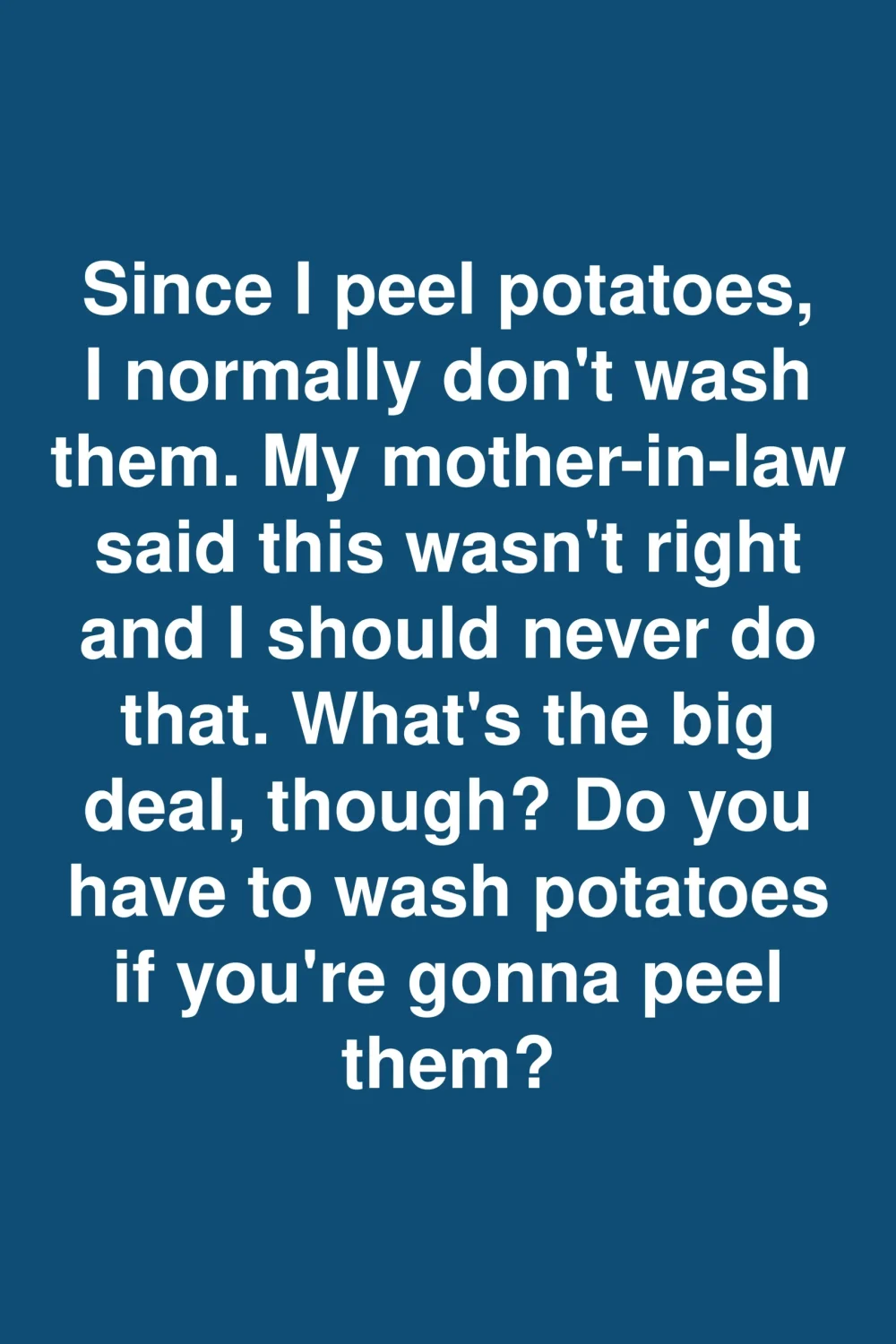Want to save this recipe?
Enter your email below and we’ll send the recipe straight to your inbox!
The Great Potato Debate: Should You Wash Before Peeling?
In kitchens across the world, a seemingly trivial question has sparked countless debates: Is it really necessary to wash potatoes if you’re just going to peel them anyway? This culinary conundrum often divides family members and cooking enthusiasts alike. While some view washing as an essential step in food preparation, others consider it a waste of time when the skin is destined for the trash bin. Let’s dig into this starchy controversy and uncover what food safety experts actually recommend.
Why Experts Recommend Washing Before Peeling
Food safety specialists overwhelmingly recommend washing potatoes before peeling them, and for good reason. Potatoes grow underground, where they come into contact with soil, bacteria, and potentially harmful microorganisms. After harvesting, they’re handled multiple times during sorting, packaging, and transportation, introducing additional contaminants to their surface.
When you peel an unwashed potato, your knife blade can transfer dirt and bacteria from the skin to the flesh. Additionally, your hands touch the contaminated surface, which can lead to cross-contamination of other foods and kitchen surfaces. This simple transfer of unseen contaminants is precisely why your mother-in-law might insist on that extra washing step.
How to Properly Prepare Potatoes for Cooking
Step 1: Rinse Under Running Water
Begin by rinsing your potatoes under cool, running water. This initial rinse helps remove loose soil and surface contaminants. Don’t use soap or produce washes, as potatoes can absorb these substances through their skin.
Step 2: Scrub the Surface
For thorough cleaning, use a vegetable brush to gently scrub the potato skin. This removes embedded dirt and bacteria that a simple rinse might miss. If you don’t have a dedicated vegetable brush, a clean kitchen brush or even a new scouring pad works well.
Step 3: Dry Before Peeling
Pat the potatoes dry with a clean kitchen towel or paper towels before peeling. This prevents slipping during peeling, making the process safer and more efficient.
Step 4: Use Clean Tools
Ensure your peeler or knife is clean before starting. After washing and peeling, sanitize your cutting board and workspace to prevent cross-contamination.
Common Potato Preparation Mistakes to Avoid
Skipping the Wash Entirely
Even if you’re planning to peel your potatoes, skipping the washing step risks transferring contaminants to the edible portions. Those few seconds of washing can prevent potential foodborne illness.
Soaking Unwashed Potatoes
Some recipes call for soaking potatoes to remove excess starch. Always wash your potatoes before soaking them; otherwise, you’re essentially creating a bacteria bath where contaminants can spread throughout the water and onto all your potato pieces.
Using the Same Cutting Surface
After peeling unwashed potatoes, your cutting board harbors transferred bacteria. Without proper cleaning, this contamination can spread to other foods prepared on the same surface.
Forgetting About Pesticide Residues
Modern potatoes are often treated with pesticides to prevent spoilage. While peeling removes some residues, the peeling process itself can transfer these chemicals to the flesh if not washed first.
Health and Safety Benefits of Proper Potato Preparation
Properly washing potatoes offers several significant benefits beyond basic cleanliness:
-
Reduced risk of foodborne illness: Removes potential pathogens like E. coli or Salmonella that might be present in soil or introduced during handling.
-
Decreased pesticide exposure: Minimizes your contact with agricultural chemicals that may remain on the skin.
-
Prevention of cross-contamination: Limits the spread of bacteria to other foods and surfaces in your kitchen.
-
Better flavor: Removes earthy or bitter notes that soil residue might introduce to your dishes.
Expert Perspectives on Potato Safety
Dr. Jennifer McEntire, food safety expert and vice president of food safety at United Fresh Produce Association, explains: “The peeling process can drag surface contaminants through the flesh of the potato. A quick wash before peeling significantly reduces this risk.”
The FDA’s guidelines for produce safety also recommend washing all produce, including items you plan to peel, to prevent the transfer of dirt and microbes from the surface to the inside during the peeling or cutting process.
Quick Recap: The Verdict on Washing Potatoes
While it might seem like an unnecessary step when you’re planning to discard the skin anyway, washing potatoes before peeling is a simple yet effective food safety practice. This small investment of time provides an important layer of protection against potential contaminants.
The next time you’re preparing potatoes and tempted to skip the wash, remember that this brief step:
- Prevents bacteria transfer from skin to flesh
- Reduces cross-contamination in your kitchen
- Removes pesticide residues
- Takes minimal extra time
- Gives you peace of mind about food safety
Your mother-in-law’s insistence on washing before peeling isn’t just an old kitchen superstition—it’s backed by food safety science and expert recommendations.
Frequently Asked Questions
Does hot water clean potatoes better than cold?
Cold or lukewarm water is actually preferable. Hot water can begin cooking the outer layer of the potato and may cause some nutrients to leach out. Additionally, the potato’s starch can activate in hot water, making the surface sticky.
Can I use vinegar to clean potatoes?
A solution of three parts water to one part white vinegar can help remove surface bacteria and some pesticide residues. However, plain water with thorough scrubbing is typically sufficient for home cooking.
Do organic potatoes need washing too?
Yes, organic potatoes still grow in soil and are handled during harvesting and transport. While they may have fewer pesticide residues, they can still harbor natural soil bacteria and contaminants.
Is it safer to just cook potatoes with the skin on?
While cooking with the skin on has nutritional benefits, it doesn’t eliminate the need for washing. Thoroughly cleaned potatoes with skins can be very nutritious, but unwashed potato skins may harbor contaminants that can survive some cooking methods.


